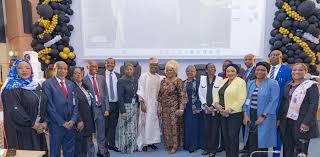…says $11bn fine huge liability
…advises against arbitrary contract award
The lawyer, who successfully ensured that the $11 billion arbitral award against Nigeria in favour of Process & Industrial Developments Ltd (P&ID) was overturned, has advised the Federal Government to, henceforth, subject all contracts to strict procurement process and due diligence to prevent re-occurrence.
The legal luminary, Shaistah Akhtar, a Partner at Mishcon de Reya LLP, who commended the role played by the legal department of the Central Bank of Nigeria (CBN) in ensuring victory for the country, admonished the government on steps to consider before awarding highly valued contracts in the future.
The recommendation focuses on strengthening procurement processes and conducting thorough due diligence to prevent a recurrence of past issues.
She spoke in Abuja during a send forth ceremony for the Director, Legal Services Department, CBN, Mr. Kofo Salam-Alada. According to Akhtar, “these are things to look out for in the procurement process and in the process of awarding these high-value contracts going forward.”
Recall that P&ID company was favoured with $11 billion arbitral award against Nigeria in London. The London High Court ultimately overturned the award on the grounds that it was obtained through fraud and corruption.
Akhtar acknowledged that despite Nigeria possessing sophisticated anti-corruption and anti-money laundering laws, “things did go wrong in this case, where government officials were bribed. The contract was not as robust as it should have been. It was quite a flimsy contract for such a long-running and high-value transaction.”
She added that “there wasn’t any due diligence carried out on the contractors, who were effectively a two-man band and an offshore company with no assets and no track record.” She noted that “there are many lessons that can be learned from the case. There were many things that went wrong. Nigeria has a very sophisticated infrastructure in terms of anti-corruption laws, anti-money laundering laws.”
Speaking further about the controversial P&ID case, Akhtar explained that “this was a case where P&ID was a shell company that brought a claim of many billions of dollars against the government in respect of a gas supply and processing agreement, which never broke ground.
“And the upshot was they obtained an arbitral award, which they were trying to enforce. By the time it got to enforcement, the award was worth around $11 billion, which amounts to around a third of Nigeria’s foreign reserves, and several times its education, health, and security budgets.” She described the potential liability as “huge.”
The government then instructed her firm to challenge the award, and they succeeded in setting it aside after overcoming several hurdles. The significance of Nigeria’s victory in the P&ID case, she noted, was multifaceted.
According to her, “the implications are, obviously a huge liability, economic liability, which has been removed. It is also a great symbol in the fight against corruption. It’s a practical implementation of the government’s anticorruption policy.
And it also sets a powerful deterrent against other fraudsters who may be trying to take advantage of the government and exploit its resources.” Akhtar also shed light on the crucial role Mr. SalamAlada played in Nigeria’s success in the P&ID case.
















